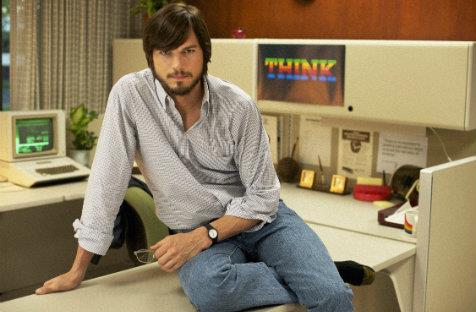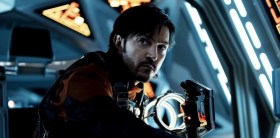Ashton Kutcher’s portrayal of Steve Jobs is all about the gaze and the gait. A determined stare is never absent from the actor’s face as he evokes the passion and intensity of the Apple co-founder, CEO and lauded visionary; likewise, his lanky frame is transformed into a hunched yet towering presence, moving with the most rigid of bounces that belies Jobs’ renowned hard-line stance on cultivating innovation. Kutcher’s physical resemblance to Jobs is striking, even beyond the superficialities of their similar appearance. Sadly, his efforts in capturing the essence of the man credited with revolutionising personal computing are watered down by decidedly average material.
Kutcher relives Jobs’ starts and struggles in the IT industry, commencing as a free-thinking college dropout, spanning his fitful attempts to ensure his company remained at the forefront of technological advancement, and winding down as Apple showed the promise of becoming the global force audiences now know. Accordingly, with director Joshua Michael Stern (Swing Vote) and first-time writer Matt Whiteley, he relates an origin story, both of the film’s titular figure, and of his legacy. The standard hallmarks of such tales, typically associated with heroes of the super variety, are evident: a troubled past, a turning point, and the pursuit of the greater good. Also obvious is an investment in the cult of its subject, with the feature’s idolatry always apparent.
As the title suggests, Jobs retains the film focus; however others fall into his orbit. As a budding entrepreneur, he seized upon the electronic engineering nous of his pal Steve Wozniak (Josh Gad, The Internship) to envision the transition of computing from the office to the home, calling in help from his friends (Lincoln’s Lukas Haas, How to Make it in America’s Victor Rasuk, and The Kids Are All Right‘s Eddie Hassell), and attracting investment from former Intel man Mike Markkula (Dermot Mulroney, Stoker) to turn a garage enterprise into a phenomenon.
Given the wealth of information available, creating a comprehensive portrait was always going to be impossible; in jOBS, finding the appropriate angle proves almost as difficult. As a chronicle of his ascension, Stern and Whiteley endeavour to touch upon as much as possible – but in this case, too much is far from a good thing. The details mirror those found in a Wikipedia entry, offering highlights without depth. The heavy-handed use of visual storytelling to fill in the gaps is often clumsy and obvious, adherence to period detail notwithstanding. Much of the dialogue mimics Jobs’ famed speeches and Apple’s advertising campaigns, saturated in marketing rhetoric and set to rousing music.
That the spirited Kutcher fares better than the feature may surprise, yet it is his convincing performance that retains interest. There’s something apt in his impressive, effort-fuelled portrayal while surrounded by less attentive and effective elements – a fitting comparison to Jobs’ story, but also to the state of the film.
Rating: 2 stars out of 5
jOBS
Director: Joshua Michael Stern
USA, 2013, 122 mins
Release date: 29 August
Distributor: Pinnacle Films
Rated: M
Actors:
Director:
Format:
Country:
Release:





